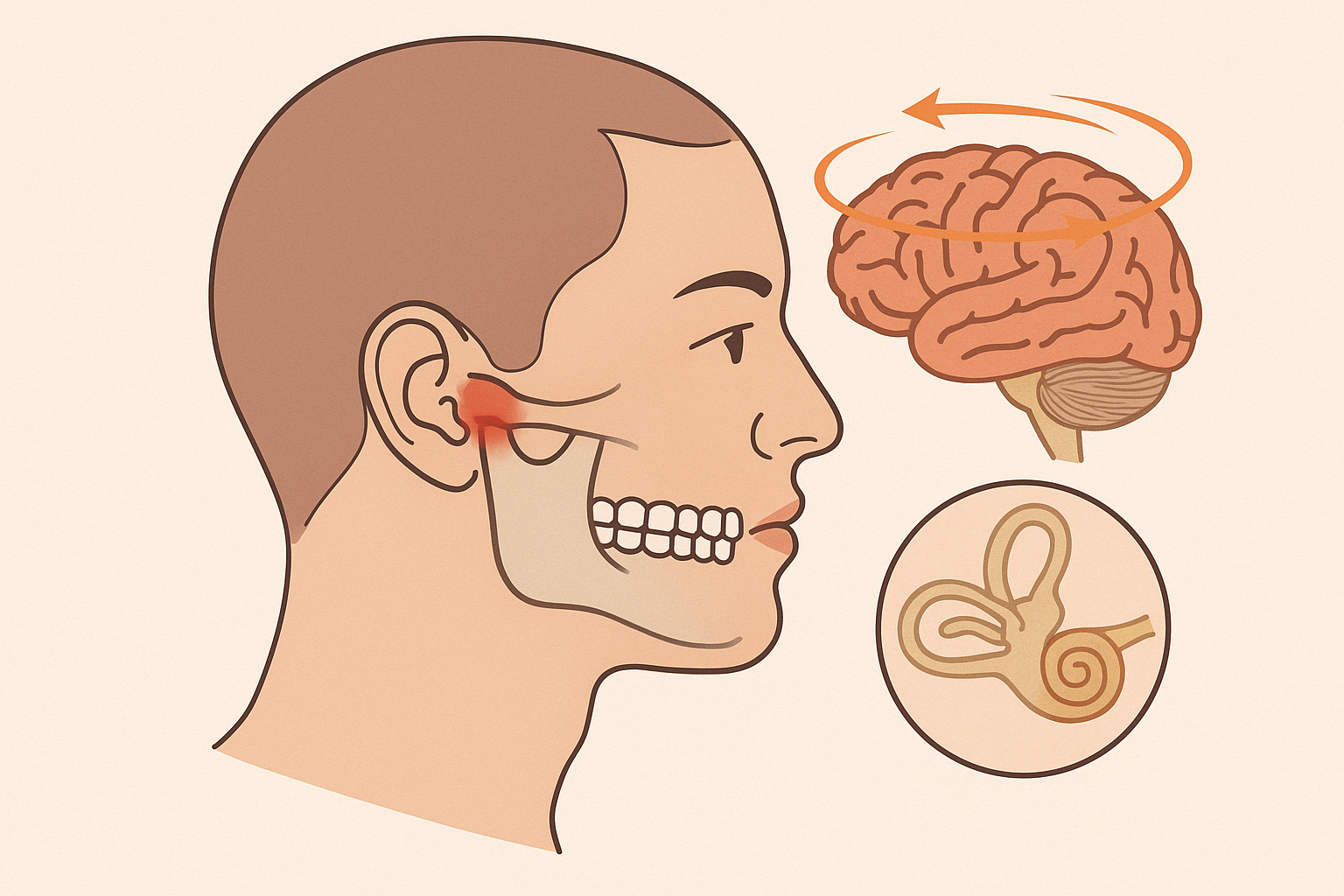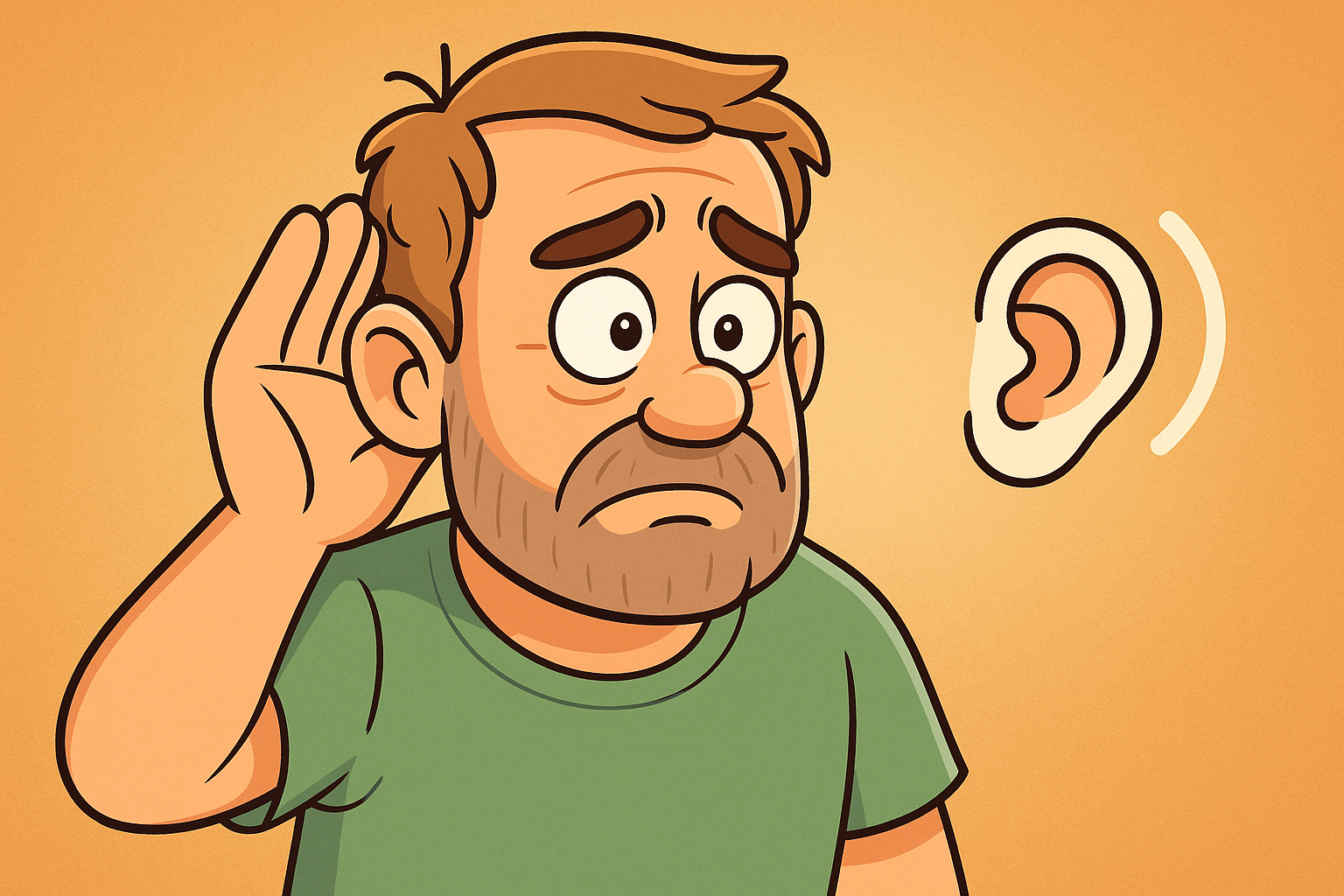Have you ever experienced a sudden wave of dizziness or a spinning sensation without warning? If you also struggle with jaw discomfort, the answer may be hidden in a condition you’ve never connected to vertigo—TMJ. Temporomandibular joint disorder (TMJ) is a frequently overlooked source of unexplained dizziness.
In this article, we’ll explore the connection between TMJ and vertigo, explain the science behind it, and walk you through symptoms, diagnosis, treatments, and practical ways to find relief.
What Is TMJ Disorder?
TMJ disorder involves dysfunction of the temporomandibular joint, which connects your jawbone to the skull and allows movements such as chewing and speaking. When this joint isn’t working properly, it can lead to a wide range of symptoms.
Common signs of TMJ disorder include:
- Jaw pain or stiffness
- Clicking or popping sounds when opening or closing the mouth
- Limited range of jaw movement
- Facial pain, especially near the temples
- Earaches or pressure in the ears
Causes may include teeth grinding (bruxism), stress-induced jaw clenching, arthritis, or trauma to the jaw area.
Can TMJ Cause Vertigo?
Yes, TMJ can cause vertigo in some people. While not everyone with TMJ experiences dizziness, medical evidence shows that dysfunction in the jaw joint can affect the inner ear’s balance system. The temporomandibular joint is located close to the structures that control equilibrium.
When this joint becomes inflamed, misaligned, or tense, it can impact nearby nerves and muscles, disrupting the vestibular system and leading to sensations of spinning, imbalance, or lightheadedness.
What Is Vertigo and How Does It Affect the Body?
Vertigo is a type of dizziness characterized by a false sense of motion—feeling like you or your surroundings are spinning. It’s a symptom, not a condition, and often stems from disturbances in the vestibular system.
Typical symptoms of vertigo include:
- A spinning or swaying sensation
- Difficulty standing or walking steadily
- Nausea or vomiting
- Tinnitus or pressure in the ears
Vertigo can be caused by inner ear issues such as BPPV, Ménière’s disease, or infections, but TMJ can also be a lesser-known contributor to balance disturbances.
How TMJ Disorder Can Lead to Vertigo
Because the temporomandibular joint is located close to the inner ear, dysfunction in this area can easily impact balance. Inflammation or tension in TMJ structures may disturb adjacent nerves and muscles that are crucial for equilibrium.
Key ways TMJ may cause vertigo include:
- Pressure on the vestibular system from nearby inflamed tissues
- Irritation of the trigeminal nerve, which shares neural pathways with balance-related systems
- Muscle strain in the jaw and neck that affects posture and spatial orientation
This overlap helps explain why people with TMJ often experience both jaw pain and dizziness.
Signs Your Vertigo May Be Related to TMJ
If you’ve been dealing with unexplained vertigo, look for the following TMJ-related warning signs:
- Dizziness combined with jaw pain, clicking, or stiffness
- Facial or temple soreness, especially on one side
- Sensation of ear pressure without infection
- Pain during chewing, yawning, or jaw movement
- Vertigo that worsens with jaw activity or stress
When these symptoms occur together, it increases the likelihood that TMJ is contributing to your balance issues.
How TMJ-Related Vertigo Is Diagnosed
Diagnosis of TMJ-related vertigo begins by eliminating more common causes of dizziness. A thorough evaluation helps determine whether the jaw is the underlying issue.
Specialists who may be involved include:
- Dentists or oral surgeons to examine jaw function
- ENT doctors to rule out ear disorders
- Neurologists for nerve assessments
- Physical therapists to assess posture and musculoskeletal imbalances
Tests may involve dental imaging (X-rays, MRI), vestibular assessments, and a detailed review of symptoms and medical history.
Treatment Options for TMJ-Induced Vertigo
Addressing TMJ disorder can often resolve associated vertigo. Treatment aims to reduce inflammation, relieve jaw tension, and restore proper alignment.
Common interventions include:
- Mouthguards or night guards to prevent grinding and clenching
- Physical therapy targeting jaw, neck, and shoulder muscles
- NSAIDs or muscle relaxants for pain and inflammation
- Stress reduction techniques, such as deep breathing or meditation
- Diet modifications, like soft food during flare-ups
In more severe cases, dental corrections or surgery may be recommended, though most patients find relief through conservative methods.
Home Remedies to Ease Symptoms
At-home care can be highly effective in reducing TMJ-related discomfort and associated vertigo. Simple lifestyle adjustments can go a long way.
Try these self-care strategies:
- Use warm compresses on the jaw to reduce stiffness
- Perform gentle stretching exercises for jaw mobility
- Avoid sticky or hard foods that stress the jaw
- Practice good posture to reduce neck and jaw tension
- Sleep on your back using a supportive pillow
Making these changes consistently can help prevent TMJ flare-ups and reduce dizziness.
When to Seek Medical Help
While TMJ-related vertigo can often be managed, certain symptoms should prompt immediate medical attention:
- Persistent or worsening dizziness
- Difficulty walking or standing
- Vision or hearing loss
- Pain spreading beyond the jaw
- Lack of improvement with home care
Seeing a healthcare provider ensures a proper diagnosis and treatment plan tailored to your unique condition.
Conclusion
TMJ and vertigo may seem unrelated, but the jaw’s proximity to your balance system creates a real, medically recognized connection. If you’re experiencing both jaw discomfort and unexplained dizziness, TMJ could be the root of your symptoms.
With proper care, most people can significantly reduce or eliminate TMJ-induced vertigo. Don’t ignore what your body is trying to tell you—understanding the jaw-balance connection is a key step toward lasting relief.
FAQs
Can TMJ really cause dizziness or vertigo?
Yes. TMJ dysfunction can irritate nerves and muscles near the inner ear, affecting your sense of balance.
What kind of doctor should I see for TMJ-related vertigo?
Start with a dentist or ENT. Depending on your symptoms, a physical therapist or neurologist may also be involved.
How long does TMJ vertigo last?
Duration varies. Symptoms may be occasional or chronic, depending on severity and treatment.
Can stress make TMJ and vertigo worse?
Yes. Stress can cause jaw clenching and muscle tension, which may worsen both TMJ and vertigo symptoms.
Are there exercises that help with TMJ vertigo?
Definitely. Gentle jaw and neck exercises can ease tension. A physical therapist can tailor a safe routine for you.









